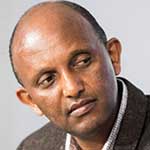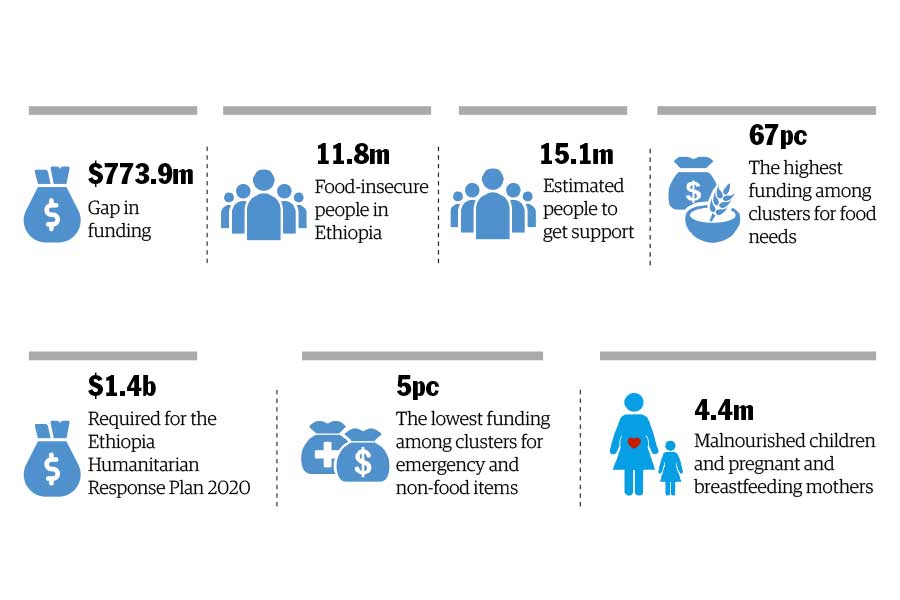
Sunday with Eden | Jan 16,2021
Vigilance right from production is crucial yet the safety of milk in Ethiopia is found substandard, containing less amount of protein and fat than required, reveals four-year research.
The nutritional composition of milk is found to have an average of 2.56pc protein and 2.57pc fat revealing 27pc less protein and 25pc less fat than the quality standard, according to the study. It has also revealed that 85pc of raw milk and 90pc of pasteurized milk are found in poor hygienic conditions.
Most products in the market cannot be considered whole milk, explained Ashagrie Zewdu (PhD), the associate professor at the Centre for Food Science & Nutrition at Addis Abeba University.
"It might as well be referred to as fasting," he said.
Ashagrie presented adulteration and scarcity of animal feed as the reasons for the low quality of raw milk. According to the study, 68.75pc of milk in Ethiopia has up to 10.4pc added water.
"Cows in the rural areas eat grass in the grazing field lacking the variety of nutritional ingredients for quality milk," he said.
Conducted by experts from Addis Abeba University in partnership with the Ethiopian Institute of Agricultural Research (EIAR), Kansas and Penn state universities, the study covered Amhara, Oromia and Southern regional states, taking over 1500 samples from farmers, collectors and processors.
Lemma Gemeda, head of the Diary Products at the Ministry of Agriculture, said they are working on the production and distribution of concentrate feed not only to upgrade the content quality of raw milk but for poultry products as well.
The research is part of the 1.1 million dollar Ensure project funded by the Bill & Melinda Gates Foundation, UKAID and the British Foreign Commonwealth & Development Office. The safety of the production and preservation process of milk and dairy products is another area the study found concerning.
Ashagrie attributes post-pasteurisation contamination due to fluctuating electricity for poor hygienic status.
"There'll be a conducive environment for exponential reproduction of microbes," he said.
Access to clean water is a challenge for farmers who are the predominant source, with food-borne pathogens easily entering milk and reproducing if the milk handler, the cow and the cattle pen are not cleaned properly and timely. More than 98pc of milk in the country is produced traditionally, according to a study conducted by TRAIDE Foundation in 2021.
Dawit Abate (PhD), an associate professor of food microbiology at Addis Abeba University believes the figure is found low as most raw milk makes its way from households of farmers than large-scale commercial productions. He suggests attracting and encouraging the private sector to invest in dairy production and processing.
"The production system must change," said Dawit.
Milk should have 3.5pc protein and 3.4pc fat content, with the research revealing pasteurised milk is found with an average of 2.42pc fat and 2.43pc protein content. There are more than 30 milk processing companies of which eight are closed due to unsettled debt with the policy bank.
The chief researcher of the Ensure project believes the extraction of dairy products is affecting the nutritional value of milk. He recommends processors label the product as "skimmed" if they extract dairy products from it.
Under MB Plc, Family Milk is the trade name for one of the processing plants near the Lebu area on the outskirts of the capital. The company produces 8,000Ltr of milk daily, operating at 17pc of its capacity due to scarce raw milk supply.
Abraham Mechal, deputy manager, said producing fat-reduced milk is a general trend among milk processors.
"We extract the cream and butter and to it for byproducts," he told Fortune.
It reported that half of the Ethiopian children are malnourished attributing low-quality milk and dairy products as a factor.
Ethiopia has an estimated 10 million cows and produces 3.2 billion litres of milk in a year. Despite having the largest number of cattle in Africa, the nationwide milk consumption stands at an average of 19.8Ltr milk a year, 11pc of WHO's recommendation. Kenya stands at 120Ltr annual consumption per person while Sudan meets the recommendation at 180Ltr in a year.
Another researcher on the Ensure project from Holeta Institute for Agricultural Research, Abdi Keba said milk contributes majorly to the cognitive development of children.
"Low quality and supply shortage are factors to the violence we're witnessing," he said.
Although pasteurised milk with poor hygienic status containing more than the average total bacterial count cannot qualify for export, Abdi throws a bone for consumers by saying it does not necessarily equate with health hazards.
"It depends on health status and immunity," he said.
Amidst local supply scarcity, the country generated 180,800 dollars from more than 640 cubic meters of milk and dairy products exported in the past seven months of the fiscal year.
The agro economist Adane Tufa argues the overall trend of exporting products without fulfilling local demands is inflating the price in the market. He said exporting milk and dairy products while even a quarter of local demand is not met is not practical.
He also questions the profit of farmers in the dynamics although urbanisation and industrialisation are scrambling resources such as land from the primary sources. Adane emphasised farmers should be trained for awareness and to improve the quality and productivity of milk and dairy products.
Excellent hygienic practices for livestock and milk handlers, and cleanliness of the milk collection containers and storage areas is vital.
PUBLISHED ON
Feb 25,2023 [ VOL
23 , NO
1191]

Sunday with Eden | Jan 16,2021

Commentaries | May 29,2021

Life Matters | May 21,2022

Verbatim | Jan 03,2021

Life Matters | Sep 08,2024

Verbatim | Nov 29,2020

Radar | Aug 22,2020

Featured | Jan 05,2020

Fortune News | Oct 11,2020

Commentaries | Nov 23,2024

Dec 22 , 2024 . By TIZITA SHEWAFERAW
Charged with transforming colossal state-owned enterprises into modern and competitiv...

Aug 18 , 2024 . By AKSAH ITALO
Although predictable Yonas Zerihun's job in the ride-hailing service is not immune to...

Jul 28 , 2024 . By TIZITA SHEWAFERAW
Unhabitual, perhaps too many, Samuel Gebreyohannes, 38, used to occasionally enjoy a couple of beers at breakfast. However, he recently swit...

Jul 13 , 2024 . By AKSAH ITALO
Investors who rely on tractors, trucks, and field vehicles for commuting, transporting commodities, and f...

Oct 18 , 2025
The political establishment, notably the ruling party and its top brass, has become p...

Oct 11 , 2025
Ladislas Farago, a roving Associated Press (AP) correspondent, arrived in Ethiopia in...

Oct 4 , 2025
Eyob Tekalegn (PhD) had been in the Governor's chair for only weeks when, on Septembe...

Sep 27 , 2025
Four years into an experiment with “shock therapy” in education, the national moo...